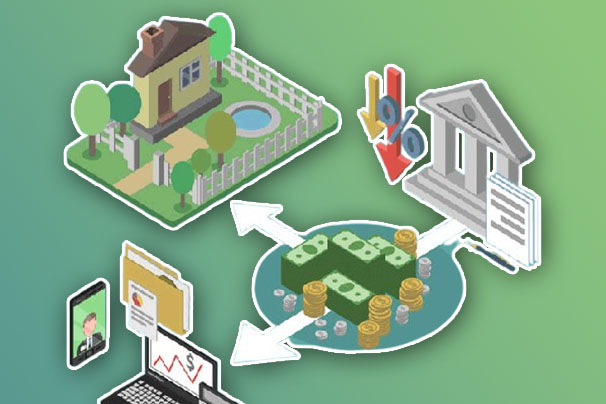Do you seek information about upfront mortgage insurance? If you answered yes to this question, then you have stumbled on the best piece of writing today! An essential component of home financing is up-front mortgage insurance. This is especially for applicants who do not have a sizable down payment.
This type of insurance, which is often connected to government-backed loans such as FHA loans, is intended to shield lenders from the risk of default and guarantee payment even in the event that the borrower defaults. Although up-front mortgage insurance can increase the affordability of homeownership for those with low resources, it raises the total cost of getting a mortgage.

This article will provide a detailed explanation of what up-front mortgage insurance is. Also, how it works, tips on how to avoid paying up-front mortgage insurance, and much more useful information.
What Is Up-Front Mortgage Insurance?
Up-Front Mortgage Insurance (UFMIP) is typically a one-time payment that borrowers are required to pay when seeking certain types of home loans. This is specifically those supported by government agencies such as the Federal Housing Administration (FHA). By offering a safety net that enables lenders to grant loans to borrowers with smaller down payments. This insurance shields them from possible losses in the case of borrower default.
UFMIP can be paid in cash at closing or financed into the mortgage. It is normally calculated as a percentage of the loan amount. While it makes it easier for many home buyers to secure financing for their property. In most cases, it raises the total cost of the loan. Therefore, before budgeting for a home purchase, borrowers should factor in the total cost of the loan they are taking out to know whether it is the best option or not.
How Does It Work?
The way UFMI works is almost similar to that of PMI, as the primary purpose of this insurance is to protect the lender should the borrower default on payment. The fee to be paid by borrowers at the initial stage of applying for the loan is to guarantee protection for lenders against losses that may occur if the borrower defaults on their mortgage.
Upfront mortgage insurance is generally calculated as a percentage of the loan amount. This is currently set at 1.75% for FHA loans, which can be rolled into the mortgage or paid in cash at closing. In addition to the one-time payment, borrowers may also be required to pay continuous monthly fees for mortgage insurance throughout the duration of the loan.
Although UFMI enables borrowers to meet the requirements for a mortgage with a smaller down payment. Typically as low as 3.5%, it can raise the total cost of homeownership for the borrower. The borrower’s capacity to save money for closing. And moving costs, two other costs related to purchasing a home, may be impacted by this additional expense.
How to Avoid Paying Up-Front Mortgage Insurance
As a homeowner, there are several ways in which you can potentially avoid paying your mortgage up front. We have helped to curate some useful tips to consider:
Apply for a Conventional Mortgage Loan
Applying for a conventional mortgage loan is one of the easiest ways to avoid having to pay up-front mortgage insurance. The majority of lenders who give you a mortgage to homeowners do not require mortgage insurance if you took out a conventional loan. This is applicable to refinancing your loan, including the actual home purchase.
Make a 20% Down Payment
You can also avoid paying up-front mortgage insurance by opting for a larger down payment. When you make a down payment of 20% or more, this would help eliminate the need for private mortgage insurance (PMI).
Look Into Special Programs
It is advisable to conduct research on first-time homebuyer programs and government-backed loans such as VA or USDA loans. These types of loans typically do not require you to have a mortgage insurance policy, ultimately helping borrowers to save on upfront costs.
Take Out a Piggyback Loan
In a bid to avoid paying this insurance, we often advise people to get a home equity loan rather than having to pay for mortgage coverage. Your home equity loan can be used to cover some percentage of your down payment and refinancing option.
Is Up-Front Mortgage Insurance Refundable?
Unfortunately, you cannot get a refund for the premiums you pay for upfront mortgage insurance; they are not refundable. However, there are cases where it may be refunded. Such as if your loan is being refinanced with another FHA mortgage. Please note that it has to be within three years of the original loan before you can be considered for a refund.
FAQs
How Is Up-Front Mortgage Insurance Calculated?
The premiums paid by borrowers on up-front mortgage insurance are typically calculated based on the percentage of the loan amount they have. For FHA loans, up-front mortgage insurance is calculated as 1.75% of the loan amount the borrower obtained.
Can I pay up-front mortgage insurance in cash?
Yes, an up-front mortgage payment can either be paid in cash or financed into the loan payment, depending on your choice. Whether you want to pay it in cash, at the end of the loan. Or refinance the loan amount, most lenders allow you to choose how you want the payment to be made.
What Are The Benefits Of Up-Front Mortgage Insurance?
Although UMFI is typically designed to protect the lender from incurring financial loss if a borrower defaults. Borrowers are also able to secure a mortgage that has a lower down payment. This has made homeownership more accessible to individuals who have little savings and limited resources.
Do All Loans Require Up-Front Mortgage Insurance?
Not all loans or lending institutions require you to have up-front mortgage insurance. UMFI is only specific to certain government-backed loans, such as FHA loans. If you are taking out a conventional loan, you may not be required to have UMFI, but there will be other eligibility requirements.



